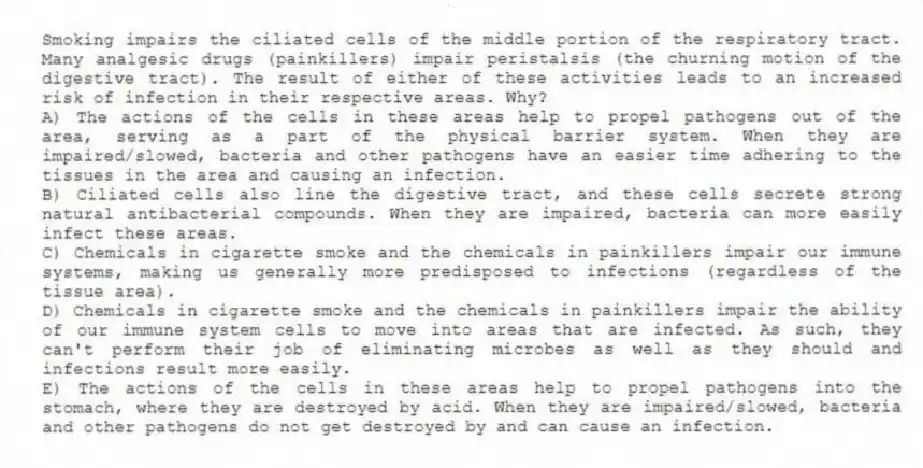
Smoking impairs the ciliated cells of the middle portion of the respiratory tract. Many analgesic drugs (painkillers) impair peristalsis (the churning motion of the digestive tract) . The result of either of these activities leads to an increased risk of infection in their respective areas. Why?
A) The actions of the cells in these areas help to propel pathogens out of the area, serving as a part of the physical barrier system. When they are impaired/slowed, bacteria and other pathogens have an easier time adhering to the tissues in the area and causing an infection.
B) Ciliated cells also line the digestive tract, and these cells secrete strong natural antibacterial compounds. When they are impaired, bacteria can more easily infect these areas.
C) Chemicals in cigarette smoke and the chemicals in painkillers impair our immune systems, making us generally more predisposed to infections (regardless of the tissue area) .
D) Chemicals in cigarette smoke and the chemicals in painkillers impair the ability of our immune system cells to move into areas that are infected. As such, they can't perform their job of eliminating microbes as well as they should and infections result more easily.
E) The actions of the cells in these areas help to propel pathogens into the stomach, where they are destroyed by acid. When they are impaired/slowed, bacteria and other pathogens do not get destroyed by and can cause an infection.
Correct Answer:
Verified
Q58: Interferon directly interacts with and destroys viruses.
Q59: During apoptosis, a cell will
A) die because
Q60: How do cytokines function?
A) They are produced
Q61: The body's own cells do not trigger
Q62: Which of the following is mismatched regarding
Q64: Fever allows the body to fight microbial
Q65: Which of the following are enzymes found
Q66: Which of the following is NOT True
Q67: Please identify the INCORRECT definition regarding innate
Q68: Which of the following is least likely
Unlock this Answer For Free Now!
View this answer and more for free by performing one of the following actions

Scan the QR code to install the App and get 2 free unlocks

Unlock quizzes for free by uploading documents